人教新课标英语必修三 Unit 1 Festivals around the world Warming Up 课件 (共51张PPT)
文档属性
| 名称 | 人教新课标英语必修三 Unit 1 Festivals around the world Warming Up 课件 (共51张PPT) | 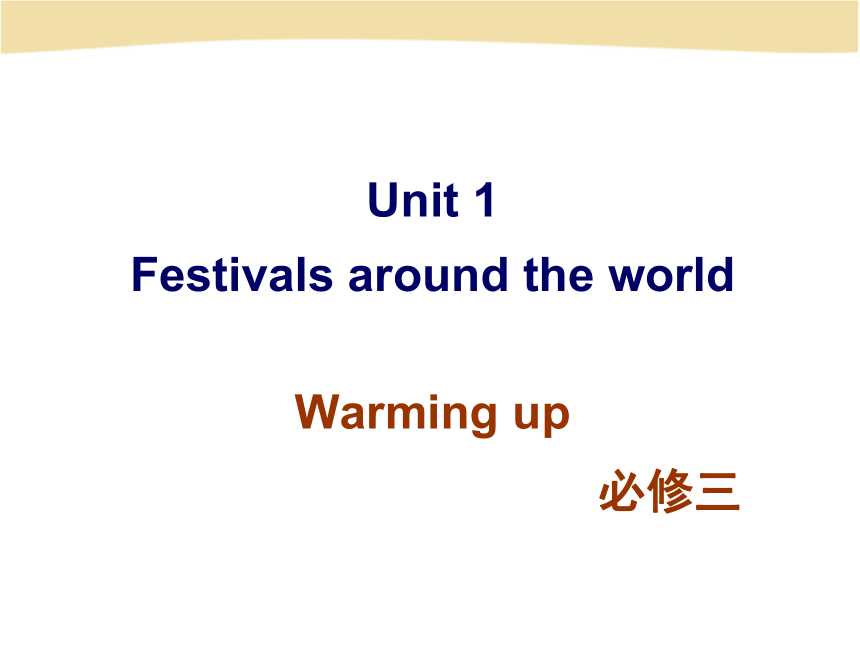 | |
| 格式 | zip | ||
| 文件大小 | 15.5MB | ||
| 资源类型 | 教案 | ||
| 版本资源 | 人教版(新课程标准) | ||
| 科目 | 英语 | ||
| 更新时间 | 2017-05-08 08:44:09 | ||
图片预览

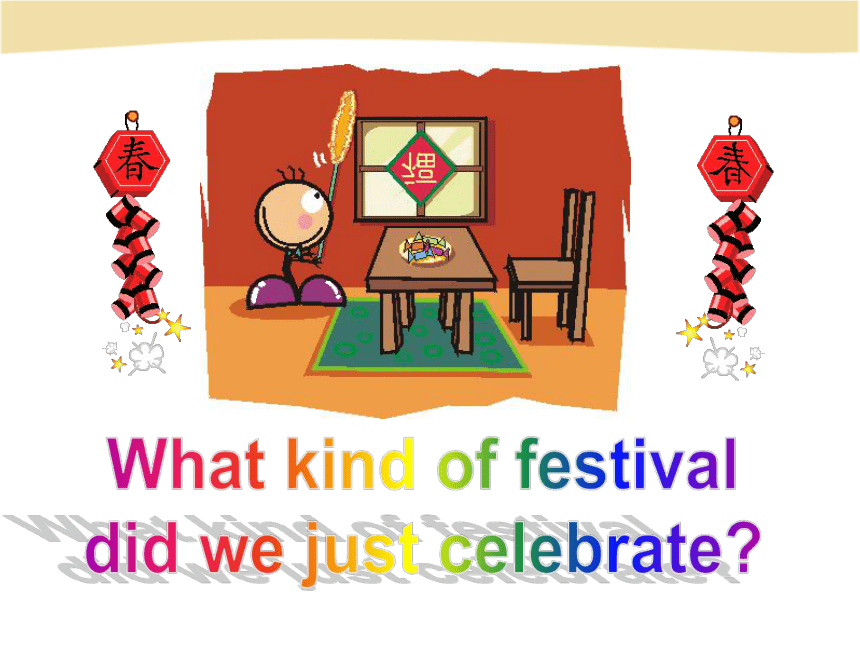
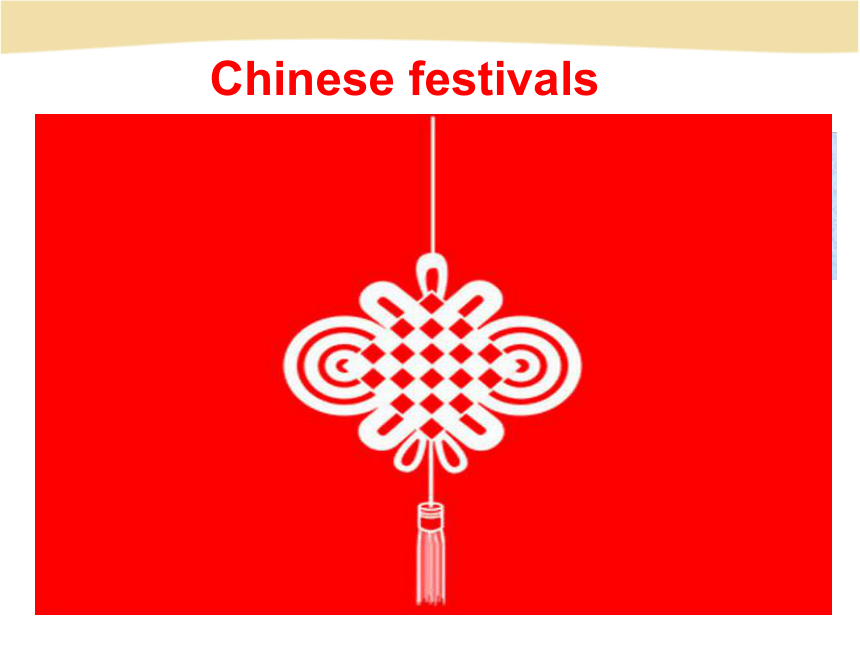
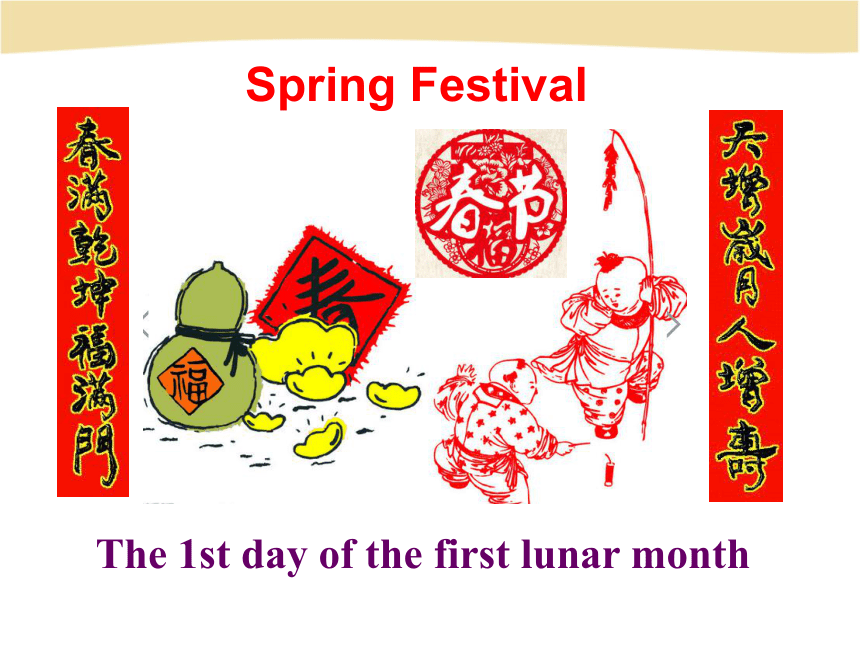
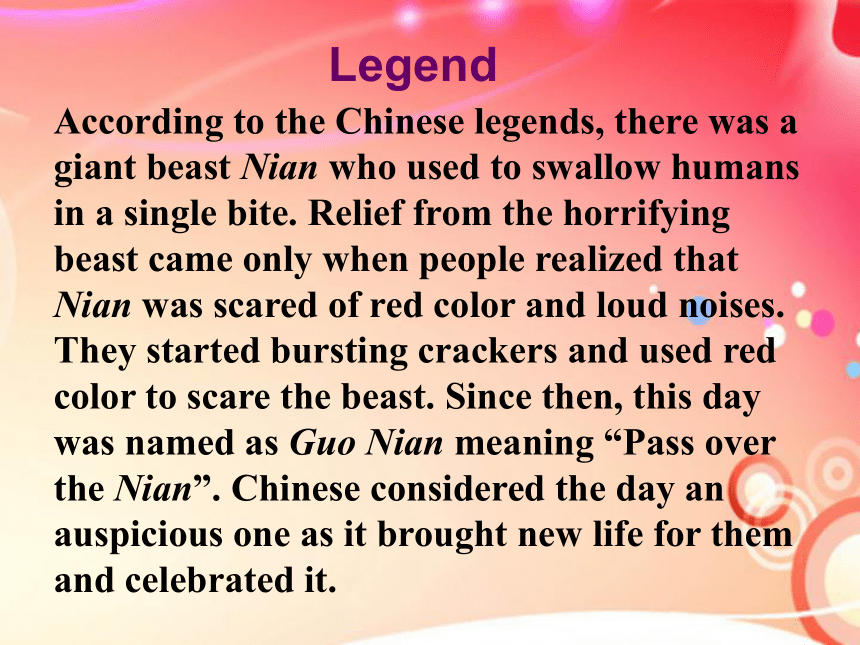
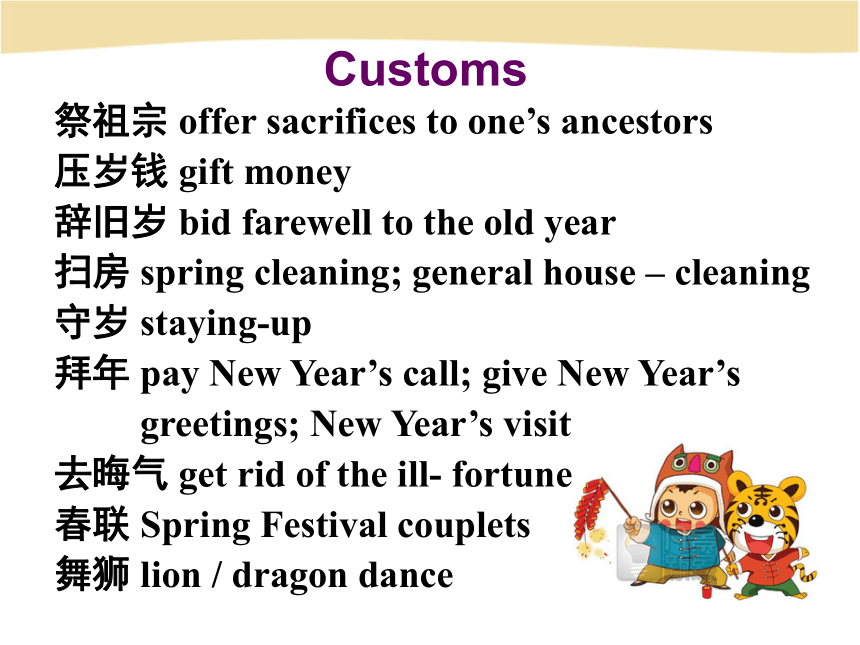
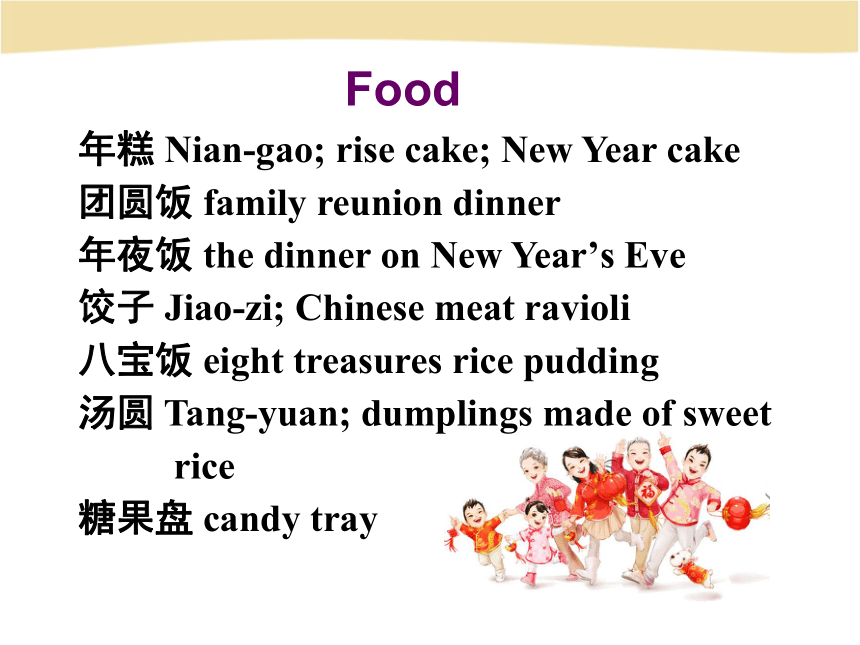
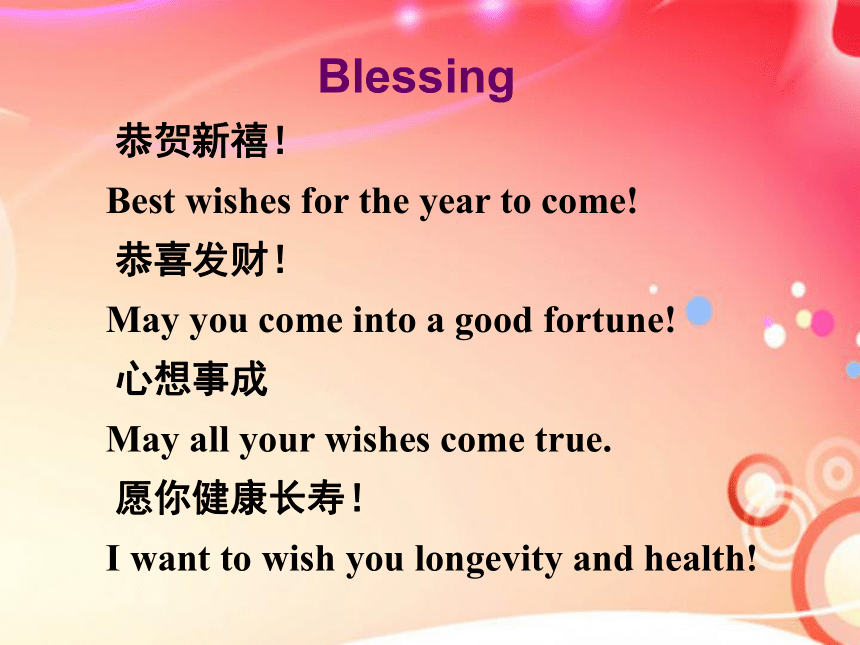
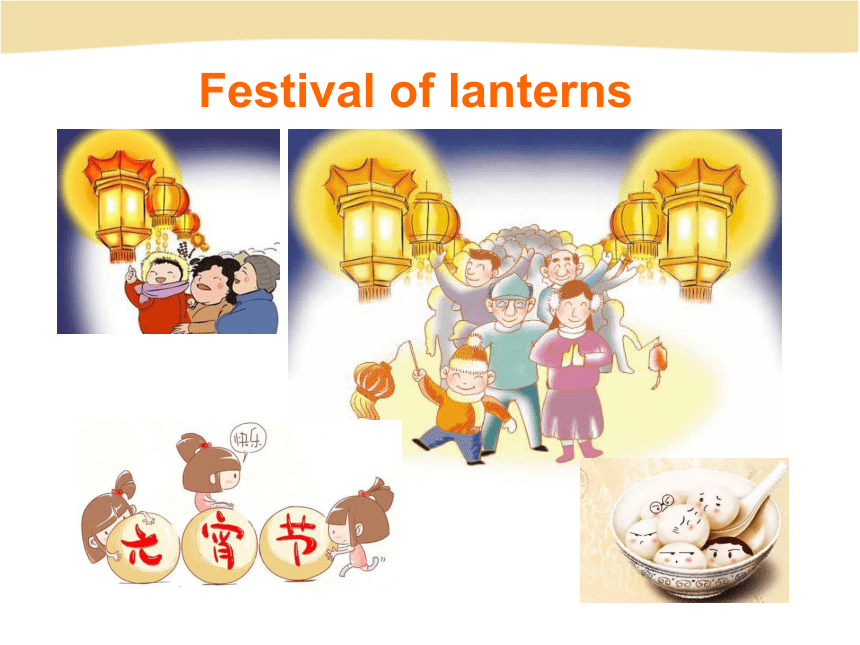
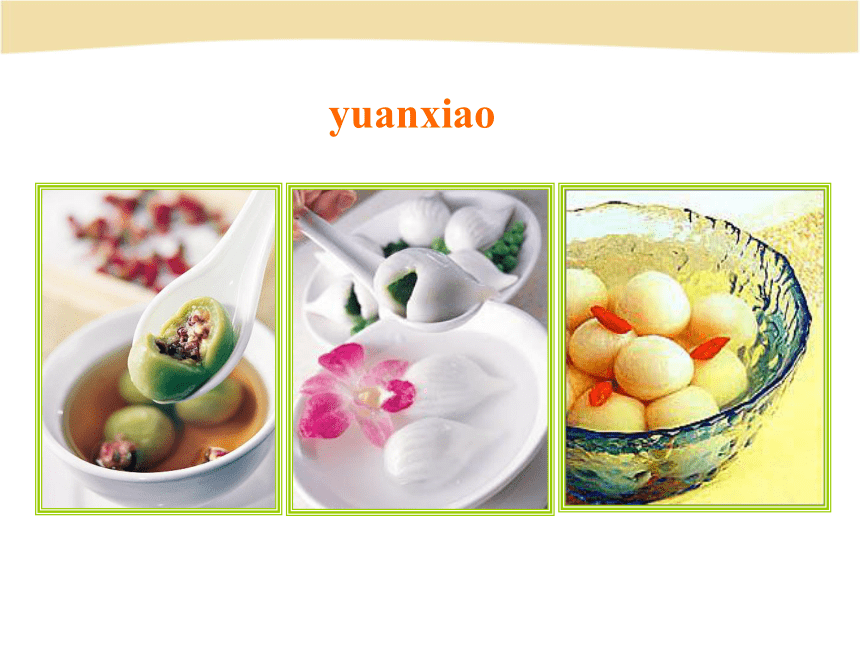

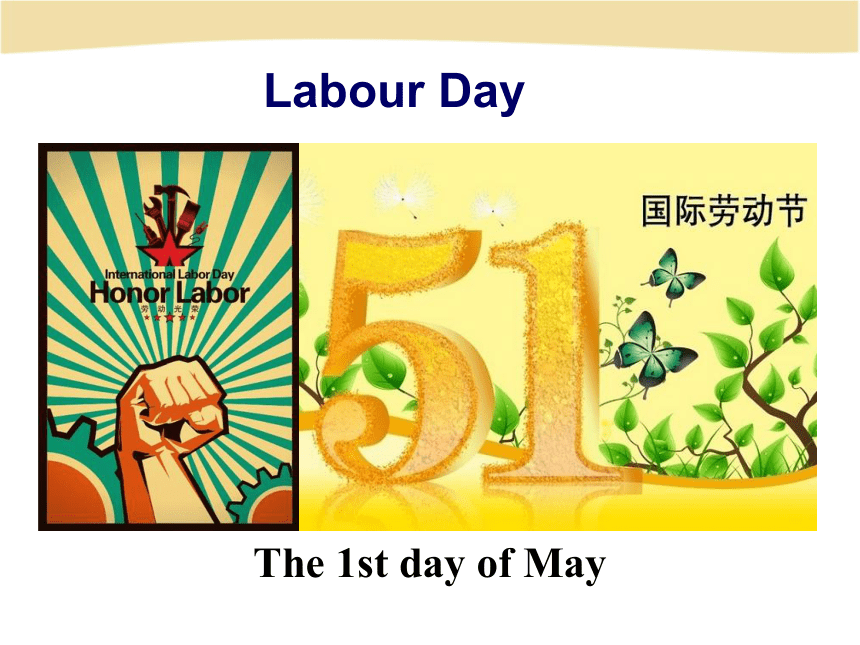
文档简介
课件51张PPT。Unit 1
Festivals around the world
Warming up必修三What kind of festival
did we just celebrate?…Chinese festivalsSpring FestivalThe 1st day of the first lunar monthAccording to the Chinese legends, there was a giant beast Nian who used to swallow humans in a single bite. Relief from the horrifying beast came only when people realized that Nian was scared of red color and loud noises. They started bursting crackers and used red color to scare the beast. Since then, this day was named as Guo Nian meaning “Pass over the Nian”. Chinese considered the day an auspicious one as it brought new life for them and celebrated it.Legend Customs 祭祖宗 offer sacrifices to one’s ancestors
压岁钱 gift money
辞旧岁 bid farewell to the old year
扫房 spring cleaning; general house – cleaning
守岁 staying-up
拜年 pay New Year’s call; give New Year’s
greetings; New Year’s visit
去晦气 get rid of the ill- fortune
春联 Spring Festival couplets
舞狮 lion / dragon dance年糕 Nian-gao; rise cake; New Year cake
团圆饭 family reunion dinner
年夜饭 the dinner on New Year’s Eve
饺子 Jiao-zi; Chinese meat ravioli
八宝饭 eight treasures rice pudding
汤圆 Tang-yuan; dumplings made of sweet
rice
糖果盘 candy tray Food 恭贺新禧!
Best wishes for the year to come!
恭喜发财!
May you come into a good fortune!
心想事成
May all your wishes come true.
愿你健康长寿!
I want to wish you longevity and health! Blessing Festival of lanternsyuanxiaoWomen’s Day-March 8The 1st day of MayLabour DayThe 1st day of JuneArmy Day-August 1stThe 15th day of the eighth lunar monthMid-Autumn FestivalThe 10th day
of September Teachers’ DayThe 1st day of OctoberNational DayfestivalsIn foreign countriesthe Cherry Blossom FestivalEvery April when the country is covered with cherry flowers.Japanese go out with their friends or families, sit under the trees, sing and have a picnic. Valentine’s DayIn FebruaryCarnival (狂欢节)Carnival
Parade and dance in the streets day and night, with loud music and colorful clothing of all kinds. The Brazilian Carnival is one of the best-known celebrations.The first Sunday after a full moon on or after March 21Easter 复活节Easter is an important religious and social festival in Christian countries.
It celebrates the return of Jesus for Christians and the coming of spring.Fool’s?DayApril 1stMother’s DayThe second Sunday in MayThanksgiving DayThe fourth Thursday in NovemberThanksgiving Day is an American traditional holiday, falling on the fourth Thursday in November, to celebrate the harvest.
The traditional food are roasting turkey, corn and pumpkin pies with ice-cream.Thanksgiving DayNovember 31stHalloween 万圣节ChristmasDiscussionChoose one of the festivals, and discuss it with your partner.
1. When the festival is?
2. What the festival celebrates?
3. What people should do or
should not do?
foodworkvisitsingingwatching TVfruitmemory Why do people like festivals?dress upfamily togetherfestivalWhich part of a festival do you like best— the activities, the music, the sights, the food or the people who visit?
Tips:
My favourite … is …
I like … best.
I prefer ….
I enjoy/like….Oral PracticeFestivals are meant to celebrate important times of a year. Different countries have different festivals. Work in groups and list below three more Chinese festivals that you know.Spring
FestivalJanuary/
Februarythe end of winter,arrival of spring, Lunar New Year, reunion with family and relativesgive money in red paper to children; see dragon dances; eat fish, prawns and dumplings;visit family membersNational
DayOctober 1the founding of the People’s Republic of China in 1949take time off work; travel to visit family or to see other parts of China; go shoppingDragon
Boat
Festival/Duanwu Festivalthe fifth day of the fifth month in lunar calendarthe memory of the beloved poet Qu Yuan who died in 278 BCeat zongzi;
watch dragon boat races; throw rice wrapped in reed leaves into water in memory of Qu Yuan; put herbs on doorways for good healthWhich is the greatest and the most important festival to Chinese people? Spring FestivalWhich is the greatest and the
most important festival to Christian
people in Western countries? ChristmasBoth of them are quite popular around the world.
Can you tell the similarities and differences between them?V.S.Language points 1. Festival are meant to celebrate important times of year. 1) mean doing sth. “意味着(必须要做某事或
导致某种结果)”, 其主语通常是指事物的
词。
2) mean to do sth. “打算或企图做某事”,
其主语通常是表示人的名词或代词, 其过去
完成式表示“本来打算做某事”。3) mean sb. to do sth. “打算让某人做某事”,
也可以用于被动结构。
4) mean 后接名词、副词或从句
表示“打算; 存心”等;
后接 that 从句, 意为“表示……”。
5) be meant for
“打算给予;打算作……用”。2. Discuss when they take place, what they
celebrate and what people do at that time.
讨论它们(中国节日)什么时间进行, 庆祝的
是什么事件, 和人们在那天所做的事。
take place 发生; 举行
The performance didn’t take place after all.
演出终于没有进行。
Was there anybody passing by when the
accident took place?
事故发生时, 有人路过那里吗?与place相关短语:in the first place 首先, 第一点
in the last place 最后
in one’s place 处于某人的位置, 为
某人设身处地想一想
in place 放在原来的位置, 就位
in place of 代替, 用……而不用……
take one’s place 找某人接替某人的位置辨析:
take place, happen, occur, break out,
come about1) take place 相当于不及物动词, 没有被动语态, 指事先计划或预想到的事情的发生。
如:
我们学校的运动会将于下周三举行。
Our school sports meeting is going to take place next Wednesday.2) happen 也是不及物动词, 没有被动语态, 指一切客观事物或情况的偶然或未能预见的发生, 可以和to连用或接that引导的从句。
如:
他碰巧没有读过那部小说。
He happened not to have read the novel.辨析:
take place, happen, occur, break out,
come about3)occur 为不及物动词, 意为“发生; 出现”, 既可指某事偶然发生, 也指某事按计划发生, 所指的时间和事件比较准确。当以具体事物作主语, 并且是某事偶然发生时, 可与happen互换。
如:
许多事故是发生在家里的。
Many accidents occur in the house.辨析:
take place, happen, occur, break out,
come about4) break out 仅用于负面场合, 常用于灾难, 战争, 疾病之类事情的突然发生, 同样也不用于被动句中。
如:
发生了大火/战争爆发了。
A fire / war broke out. 辨析:
take place, happen, occur, break out,
come about5) come about 属于中性词组, 既可用于表达正面事情的发生, 又可用于表达负面事情的发生。
你能告诉我事故是怎样发生的吗?
Can you tell me how the accident came about?辨析:
take place, happen, occur, break out,
come aboutHomework Write a passage about your
favorite Chinese festival
in about 150 words.
2. Preview the reading part:
Festivals and CelebrationsThank You!
Festivals around the world
Warming up必修三What kind of festival
did we just celebrate?…Chinese festivalsSpring FestivalThe 1st day of the first lunar monthAccording to the Chinese legends, there was a giant beast Nian who used to swallow humans in a single bite. Relief from the horrifying beast came only when people realized that Nian was scared of red color and loud noises. They started bursting crackers and used red color to scare the beast. Since then, this day was named as Guo Nian meaning “Pass over the Nian”. Chinese considered the day an auspicious one as it brought new life for them and celebrated it.Legend Customs 祭祖宗 offer sacrifices to one’s ancestors
压岁钱 gift money
辞旧岁 bid farewell to the old year
扫房 spring cleaning; general house – cleaning
守岁 staying-up
拜年 pay New Year’s call; give New Year’s
greetings; New Year’s visit
去晦气 get rid of the ill- fortune
春联 Spring Festival couplets
舞狮 lion / dragon dance年糕 Nian-gao; rise cake; New Year cake
团圆饭 family reunion dinner
年夜饭 the dinner on New Year’s Eve
饺子 Jiao-zi; Chinese meat ravioli
八宝饭 eight treasures rice pudding
汤圆 Tang-yuan; dumplings made of sweet
rice
糖果盘 candy tray Food 恭贺新禧!
Best wishes for the year to come!
恭喜发财!
May you come into a good fortune!
心想事成
May all your wishes come true.
愿你健康长寿!
I want to wish you longevity and health! Blessing Festival of lanternsyuanxiaoWomen’s Day-March 8The 1st day of MayLabour DayThe 1st day of JuneArmy Day-August 1stThe 15th day of the eighth lunar monthMid-Autumn FestivalThe 10th day
of September Teachers’ DayThe 1st day of OctoberNational DayfestivalsIn foreign countriesthe Cherry Blossom FestivalEvery April when the country is covered with cherry flowers.Japanese go out with their friends or families, sit under the trees, sing and have a picnic. Valentine’s DayIn FebruaryCarnival (狂欢节)Carnival
Parade and dance in the streets day and night, with loud music and colorful clothing of all kinds. The Brazilian Carnival is one of the best-known celebrations.The first Sunday after a full moon on or after March 21Easter 复活节Easter is an important religious and social festival in Christian countries.
It celebrates the return of Jesus for Christians and the coming of spring.Fool’s?DayApril 1stMother’s DayThe second Sunday in MayThanksgiving DayThe fourth Thursday in NovemberThanksgiving Day is an American traditional holiday, falling on the fourth Thursday in November, to celebrate the harvest.
The traditional food are roasting turkey, corn and pumpkin pies with ice-cream.Thanksgiving DayNovember 31stHalloween 万圣节ChristmasDiscussionChoose one of the festivals, and discuss it with your partner.
1. When the festival is?
2. What the festival celebrates?
3. What people should do or
should not do?
foodworkvisitsingingwatching TVfruitmemory Why do people like festivals?dress upfamily togetherfestivalWhich part of a festival do you like best— the activities, the music, the sights, the food or the people who visit?
Tips:
My favourite … is …
I like … best.
I prefer ….
I enjoy/like….Oral PracticeFestivals are meant to celebrate important times of a year. Different countries have different festivals. Work in groups and list below three more Chinese festivals that you know.Spring
FestivalJanuary/
Februarythe end of winter,arrival of spring, Lunar New Year, reunion with family and relativesgive money in red paper to children; see dragon dances; eat fish, prawns and dumplings;visit family membersNational
DayOctober 1the founding of the People’s Republic of China in 1949take time off work; travel to visit family or to see other parts of China; go shoppingDragon
Boat
Festival/Duanwu Festivalthe fifth day of the fifth month in lunar calendarthe memory of the beloved poet Qu Yuan who died in 278 BCeat zongzi;
watch dragon boat races; throw rice wrapped in reed leaves into water in memory of Qu Yuan; put herbs on doorways for good healthWhich is the greatest and the most important festival to Chinese people? Spring FestivalWhich is the greatest and the
most important festival to Christian
people in Western countries? ChristmasBoth of them are quite popular around the world.
Can you tell the similarities and differences between them?V.S.Language points 1. Festival are meant to celebrate important times of year. 1) mean doing sth. “意味着(必须要做某事或
导致某种结果)”, 其主语通常是指事物的
词。
2) mean to do sth. “打算或企图做某事”,
其主语通常是表示人的名词或代词, 其过去
完成式表示“本来打算做某事”。3) mean sb. to do sth. “打算让某人做某事”,
也可以用于被动结构。
4) mean 后接名词、副词或从句
表示“打算; 存心”等;
后接 that 从句, 意为“表示……”。
5) be meant for
“打算给予;打算作……用”。2. Discuss when they take place, what they
celebrate and what people do at that time.
讨论它们(中国节日)什么时间进行, 庆祝的
是什么事件, 和人们在那天所做的事。
take place 发生; 举行
The performance didn’t take place after all.
演出终于没有进行。
Was there anybody passing by when the
accident took place?
事故发生时, 有人路过那里吗?与place相关短语:in the first place 首先, 第一点
in the last place 最后
in one’s place 处于某人的位置, 为
某人设身处地想一想
in place 放在原来的位置, 就位
in place of 代替, 用……而不用……
take one’s place 找某人接替某人的位置辨析:
take place, happen, occur, break out,
come about1) take place 相当于不及物动词, 没有被动语态, 指事先计划或预想到的事情的发生。
如:
我们学校的运动会将于下周三举行。
Our school sports meeting is going to take place next Wednesday.2) happen 也是不及物动词, 没有被动语态, 指一切客观事物或情况的偶然或未能预见的发生, 可以和to连用或接that引导的从句。
如:
他碰巧没有读过那部小说。
He happened not to have read the novel.辨析:
take place, happen, occur, break out,
come about3)occur 为不及物动词, 意为“发生; 出现”, 既可指某事偶然发生, 也指某事按计划发生, 所指的时间和事件比较准确。当以具体事物作主语, 并且是某事偶然发生时, 可与happen互换。
如:
许多事故是发生在家里的。
Many accidents occur in the house.辨析:
take place, happen, occur, break out,
come about4) break out 仅用于负面场合, 常用于灾难, 战争, 疾病之类事情的突然发生, 同样也不用于被动句中。
如:
发生了大火/战争爆发了。
A fire / war broke out. 辨析:
take place, happen, occur, break out,
come about5) come about 属于中性词组, 既可用于表达正面事情的发生, 又可用于表达负面事情的发生。
你能告诉我事故是怎样发生的吗?
Can you tell me how the accident came about?辨析:
take place, happen, occur, break out,
come aboutHomework Write a passage about your
favorite Chinese festival
in about 150 words.
2. Preview the reading part:
Festivals and CelebrationsThank You!
同课章节目录
